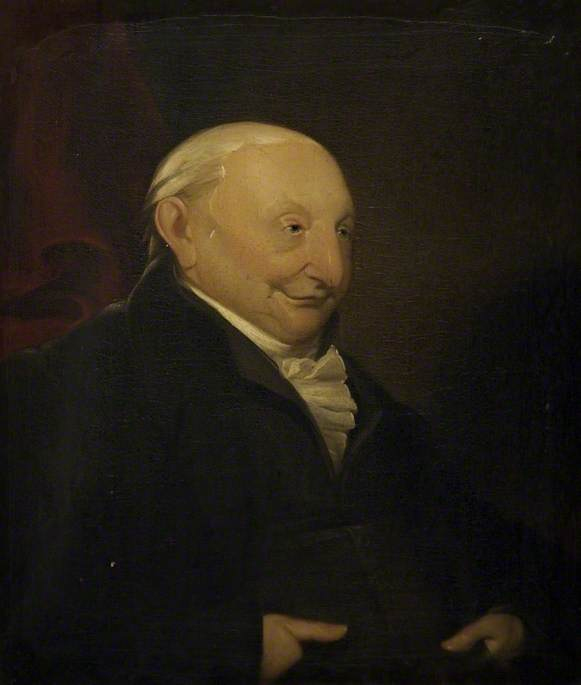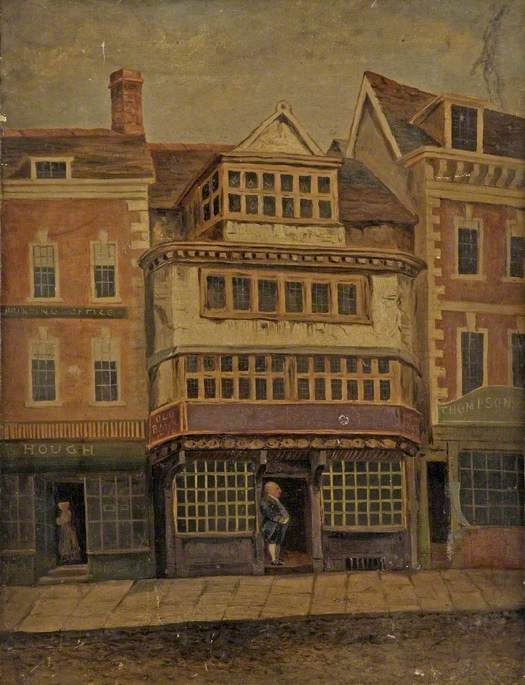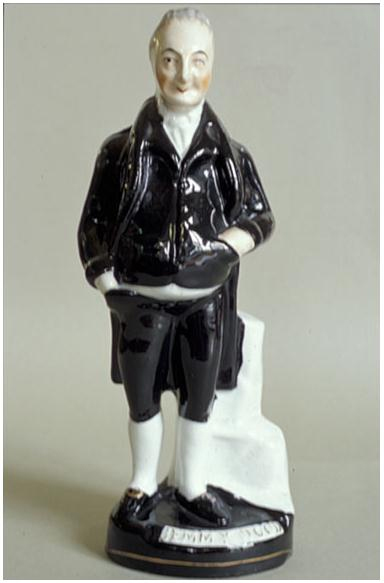He was not what you’d call a looker. In profile Jemmy Wood bore a passing resemblance to Mr Punch following a good lunch – but James Wood esq, ‘the eccentric banker, merchant and draper’ of the city of Gloucester, England who died aged 80 on this day in 1836, in his old house above the shop in Westgate Street – died very rich indeed.

His is a story of ‘not quites’. He was not quite the millionaire that the speculations claimed, but pretty close – at a time when to die with a couple of thousand made you rich indeed, £781,107 ten shillings and fourpence made you spectacularly so. His bank was not quite the oldest in the land, but it was pretty darn close. His grandfather started Wood & Co or Gloucester Old Bank in 1716, making it the fourth oldest.
Strolling down his street you could easily miss the bank. It was in a jettied Jacobean or Elizabethan house and shop and through the bullseye glass of the shop windows were displayed buttons, ribbons and threads – it doubled as a drapers and haberdashery.
In one corner of the shop was a tiny wooden counter with scales. You could tell it was a bank and you could ascertain what kind of a banker was Wood, by the counterfeit coins that had been nailed to the counter top to warn any future fraudsters. As a practical man Jemmy decided early on that it was not in his interest to give interest on any deposits shorter than a year — even by a day. Jemmy Wood was mean.
In fact he was a miser. He dressed cheaply, he spent little. He was said to have hung around the local docks to gather coal that was dropped as the collier ships were unloaded. Once he went to one of his local farm properties in his shabby tramp like coat and while he was there decided to pick some of his own turnips for himself – only to be beaten by a farm labourer, once for stealing and once more for claiming to be the owner of the field.
He was self-aware though. When journeying by coach to London for his amusement he bet a fellow passenger who had made fun of his cheap old suit that he could do something the other could not. The challenge he set seemed outrageous. The poorly dressed Wood challenged his fellow passenger that when they reached the capital they should each see if they could persuade a bank to advance them a cheque for £100,000. Naturally Jemmy won his £5 bet.
After selling yards of ribbon and a thousand sewing needles and thimbles, interspersed with high finance, all his long life, the renowned banker expired. Unmarried and with no living relatives, it was inevitable that flies began to gather about the jam pot that was old Jemmy’s loot.
He had made a will though, leaving everything to four executors – or so it seemed. In the battle over the will that lasted years and sapped about half the money it turned out that the lawyer who drew up the will and appeared to be getting a quarter of the money had fiddled with the paperwork. On hearing the old miser was sick he had made a mercy dash from London to Gloucester while Wood lay morphine-adled and dying. The lawyer took papers from Wood’s bureau, stitched together sheets that had been signed and those that had not, using Wood’s own seal. He then burnt inconvenient codocils that gave away some of the money to the city of Gloucester and some other people. Triumphantly he ‘discovered’ the convenient version of the will. His downfall was that one of the servants had rescued from the grate a bit of the bonfire of inconvenient truth and anonymously sent it to one of those cut out from the will.
Despite a reward of £10,000 advertised for information as to who did save the codocil, no-one came forward. Like some early episode of CSI Gloucester, lawyers pored forensically over the handwriting and the spelling comparing it with Wood’s day book and accounts. In the end the foursome did get the money — less the cost of getting it, but the judgement concluded that the lawyer had indeed massaged the document.
When he was found out, he did the right thing and hanged himself – lawyers, eh?


1 comment
Comments are closed.